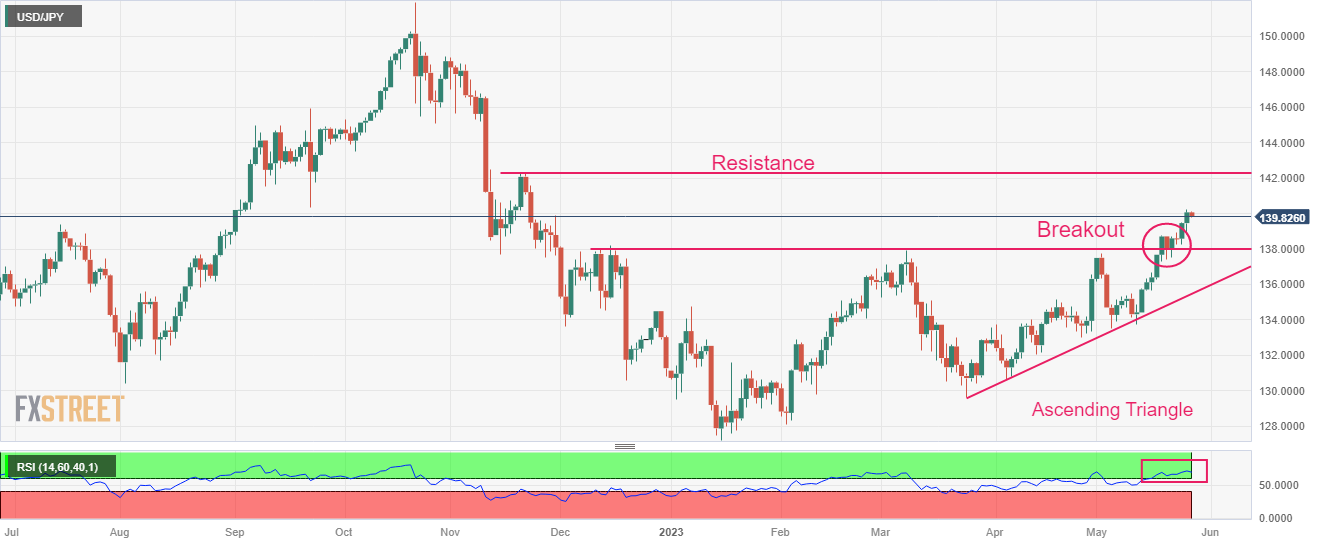- Analytics
- News and Tools
- Market News
- USD/JPY fits below 140.00 as USD Index extends further ahead of US Durables Goods Orders
USD/JPY fits below 140.00 as USD Index extends further ahead of US Durables Goods Orders
- USD/JPY has shifted comfortably below 140.00 amid an extended correction in the USD index.
- FOMC minutes dictated that several Federal Reserve policymakers cited that more interest rates are less certain.
- Bank of Japan has remained room open for shortening the duration of bond yield targets to a 5-year zone from the current 10-year as a part of YCC.
- USD/JPY has added significant gains after delivering a breakout of the Ascending Triangle pattern.
The USD/JPY pair has shifted its auction below the crucial support of 140.00 in the Asian session. The asset turned delicate following the footprints of the US Dollar Index (DXY). The USD Index has extended its correction to near 104.11 after failing to hold a fresh two-month high at 104.31. The correction in the USD/JPY pair seems higher in proportion than the correction in the USD index, which also indicates that the Japanese Yen has also gained some strength.
S&P500 futures have extended losses in the Asian session, portraying an extension in the risk-aversion theme. US equities were significantly bought on Thursday led by a solid recovery in technology and financial stocks. Meanwhile, investors are getting anxious as negotiations among White House officials and Republican leaders seem never-ending due to which the United States economy is approaching a default situation swiftly.
Fears of a default by the US economy are fueling gains in US Treasury yields. The yields offered on 10-year US government bonds have climbed above 3.83%.
On Friday, a power-pack action is expected from the USD Index amid the release of the US Durables Goods Orders data (April). The economic data is seen contracting by 1.0% against an expansion of 3.2% reported earlier.
Federal Reserve policymakers support no rate hike in June
Plenty of economic indicators in the United States economy are appealing for a pause in the policy-tightening spell by the Federal Reserve (Fed) in its June monetary policy meeting. US labor market conditions have started releasing heat, Consumer Price Index (CPI) is consistently decelerating, and firms are anticipating a bleak economic outlook. On Thursday, Reuters reported that weekly Federal Reserve emergency lending to banks fell to its lowest level since the banking sector ran into trouble in March. This indicates that firms are deploying their retained earnings to cater to their working capital requirements to avoid higher interest rates or are operating at a lower capacity.
Investors should note that minutes from May’s Federal Open Market Committee (FOMC) dictate that several Federal Reserve policymakers cited that more interest rates are less certain due to tight credit conditions by US regional banks.
Expectations of a hold in the rate-hiking spell for June got more solid after dovish commentary from Boston Federal Reserve Bank President Susan Collins said on Thursday that the Federal Reserve "may be at or near" the time to pause interest rate increases, as reported by Reuters. She further added, "While inflation is still too high, there are some promising signs of moderation,"
Bank of Japan could tweak Yield Control Curve ahead
Bank of Japan (BoJ) Governor Kazuo Ueda said on Thursday that they could tweak the Yield Curve Control (YCC) strategy if the balance between the benefit and the cost of the policy were to shift. The Bank of Japan has remained room open for shortening the duration of bond yield targets to a 5-year zone from the current 10-year as a part of YCC.
Meanwhile, the Japanese Yen has got some strength after the release of decelerated Tokyo CPI (May) data. Headline inflation has softened to 3.2% from the prior release of 3.5% while the street was anticipating acceleration to 3.9%. Core CPI that excludes oil and food prices landed lower at 3.9% vs. the estimates of 4.3% but remained higher than the former release of 3.8%.
USD/JPY technical outlook

USD/JPY has added significant gains after delivering a breakout of the Ascending Triangle chart pattern formed on the daily scale. The asset is aggressively marching towards the horizontal resistance plotted from 11 November 2022 high at 142.25.
The Relative Strength Index (RSI) (14) is oscillating in the bullish range of 60.00-80.00, which indicates that the upside momentum is active.
© 2000-2026. All rights reserved.
This site is managed by Teletrade D.J. LLC 2351 LLC 2022 (Euro House, Richmond Hill Road, Kingstown, VC0100, St. Vincent and the Grenadines).
The information on this website is for informational purposes only and does not constitute any investment advice.
The company does not serve or provide services to customers who are residents of the US, Canada, Iran, The Democratic People's Republic of Korea, Yemen and FATF blacklisted countries.
Making transactions on financial markets with marginal financial instruments opens up wide possibilities and allows investors who are willing to take risks to earn high profits, carrying a potentially high risk of losses at the same time. Therefore you should responsibly approach the issue of choosing the appropriate investment strategy, taking the available resources into account, before starting trading.
Use of the information: full or partial use of materials from this website must always be referenced to TeleTrade as the source of information. Use of the materials on the Internet must be accompanied by a hyperlink to teletrade.org. Automatic import of materials and information from this website is prohibited.
Please contact our PR department if you have any questions or need assistance at pr@teletrade.global.















